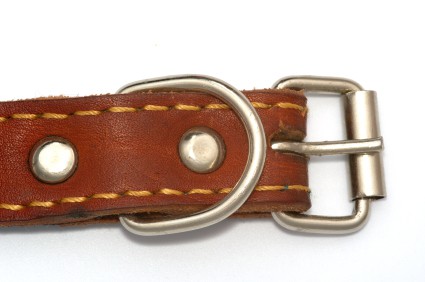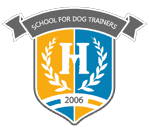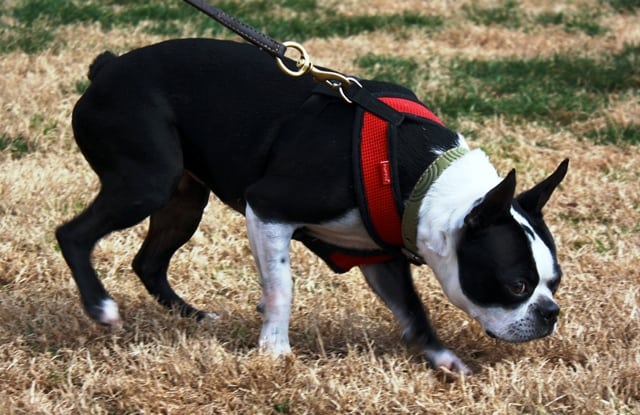Comparing Dog Training Tools and Dog Management Tools
It’s been rather wet and soggy this week; we even saw a couple of inches of snow! But today the sun is shining and the sky is blue. We modified our training schedule this week to keep students and dogs out of the elements as much as possible. Lectures and instruction this week focused on various tools available to dog trainers and schedules of reinforcement.
There are many dog training tools available for training and managing dog behavior. They come in many different materials from metal, to cotton, to nylon, to stainless steel, to plastic. So how do you know what product is best for your dog and his behavior?
A common problem many owners have with their dogs is pulling on the leash. A short list of products that are available which are designed to assist owners with their dogs with this specific problem may include: head halters, body harnesses, bungee leashes, flexi-leads, choke chains, prong collars, and remote collars.
 Some of these products are designed to manage problems, while others are used to train the dog to behave differently. At Highland Canine Training, we believe in training a dog in the behaviors we want to see, not in masking the problem. If the dog is properly trained, he will behave himself with different handlers and in a variety of environments. If he is only managed, the problems continue to exist and can be harmful to the dog and others.
Some of these products are designed to manage problems, while others are used to train the dog to behave differently. At Highland Canine Training, we believe in training a dog in the behaviors we want to see, not in masking the problem. If the dog is properly trained, he will behave himself with different handlers and in a variety of environments. If he is only managed, the problems continue to exist and can be harmful to the dog and others.
Head halter: This product is gaining popularity among pet owners and among some dog trainers. It is marketed as a humane tool to help resolve the issue of a dog pulling on the leash. The dog’s neck is unsupported with the head halter, and the owner is able to direct the dog’s head position using the leash. Unfortunately, it can be dangerous for dogs if used improperly. An improper pull on the leash from an owner, and the dog can pull a neck muscle or cause more serious damage. The head halter gives the impression that it resolves the problem of pulling on the leash; however, remove it for just a single walk, and it becomes clear that the product merely masks the problem. The dog is not learning new behavior, so there will likely never be a time when the head halter is not required.
Body harness: There are several types of body harnesses available; some harnesses connect to the leash on the chest strap, and others attach to a ring on the back. Like head halters, harnesses are also a management tool rather than a training device. Harnesses that connect on the back of the dog were initially designed for dogs to pull loads; with those origins in mind, it is hardly surprising to find they are generally ineffective at keeping a dog from pulling on a leash. The type with the chest attachment is not much better. It is recommended by some trainers because it doesn’t put pressure on the dog’s neck, but still requires a lot of pulling on the leash to direct the dog’s entire front end one direction or another. This is another example of a management tool, and not a training device.
Bungee leash: Bungee leashes are a relatively new invention. They combine a standard leash with bungee parts to reduce shoulder strain on owners and neck strain on dogs as they pull. While it may work exactly as advertised, it is doing nothing to train the unwanted behavior out of the dog. Owners who use this management leash can expect that pulling will continue on their walks.
Flexi-lead: Flexi-leads might be the worst idea ever when it comes to walking a dog. Read enough product reviews and one will notice multiple stories from people where these products failed, allowing the dog to escape after a squirrel, or run headlong into an enticing, but dangerous situation. People who buy this product frequently want to “give their dog more freedom” to sniff around, while still maintaining some control. If your dog is a puller, this product is far from fail-safe, and will not help you manage the behavior. A better option would be training the dog to walk by your side without pulling, coupled with a reliable recall for situations when you want your dog to have more freedom.
Choke chain: Choke chains are one of the oldest dog training tools around. They are found everywhere, and many trainers still recommend them for owners with dogs that pull on the leash. The difficulty with choke chains is that using them properly is nearly impossible because of their design. Their size cannot be adjusted, and they are almost universally worn too large. When used properly, they can give an effective correction; however, the odds of using one properly are low, and improper use can cause serious damage to a dog’s trachea. It is not a training tool we recommend.
Prong collar: The number one concern expressed about the prong collar seems to be related to appearance. It looks like it could be a medieval torture device. Looks are deceptive. The prong collar, when fitted and used properly, provides a correction dog’s innately understand with the first use, because it mimics the correction an adult dog would give to a misbehaving dog. If used properly, the prong collar will not harm the dog nor the relationship the owner has with the dog. It is an extremely effective training tool for dogs that pull on the leash. It is a temporary training collar, which means the dog learns to stop pulling on the leash, and can eventually transition to walking in the heel position using only a flat collar.
Remote collar: The remote training collar is another training device that garners mixed reviews from people. When used properly, it is effective to train dogs of all types and temperaments. As with the prong collar, dogs learn to walk in the heel position, rather than pulling ahead on the leash. It is a great communication device when used correctly.
At Highland Canine Training LLC, we have trainers available to teach you more about the proper use of training devices. If you are interested in learning more about how to employ their use and sharing your knowledge with others, sign up for one of our dog training courses! You’ll be glad you did. Contact us via email at training@highlandcanine.com or by phone at 866.200.2207 for more information on starting or expanding your professional dog training career!


5 thoughts on “Dog Training Tools vs. Dog Management Tools”